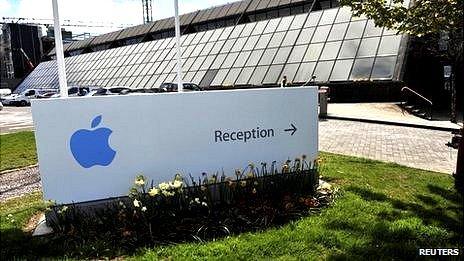Republic of Ireland calls for international tax action
- Published

Apple has been criticised for funnelling profits through its Irish subsidiaries
A Republic of Ireland politician says the international community must work together to stop large multinational firms using cross-border tax loopholes.
"They play the tax codes one against the other," Enterprise Minister Richard Bruton told national broadcaster RTE.
"That is tax planning and I think we do need international cooperation through the OECD to deal with the aggressive nature of that."
It comes as EU leaders meet in Brussels to discuss tackling tax avoidance.
UK Prime Minister David Cameron and others will be looking at ways of cracking down on those who do not pay their fair share of tax.
Mr Cameron will urge EU leaders to back global action against tax evasion and "aggressive" tax avoidance that is causing nations "staggering" losses.
Danny Alexander, Chief Secretary to the Treasury, told BBC' Radio 4's World at One programme that tackling the issue was a "central priority" for the UK's presidency of the G8.
And Ireland's Taoiseach Enda Kenny is likely to face a tough time at the summit amid accusations - both overseas and within Ireland - of a loose tax regime.
'Tax haven'
The meeting comes as Apple is under fire over its tax use of Irish subsidiaries.
On Tuesday, Apple's chief executive Tim Cook appeared before a Senate committee for a grilling over the firm's tax arrangements.
Earlier, the head of a Senate committee panel had accused Apple of "exploiting an absurdity" in its tax payments.
Apple had been accused by the Senate Permanent Subcommittee on Investigations, which has been examining "methods employed by multinational corporations to shift profits offshore", of being "among America's largest tax avoiders".
The panel revealed Apple had paid just 2% tax on $74bn in overseas income, mainly by exploiting a loophole in Ireland's tax code.
And in a 40-page memorandum, the Senate committee said: "Ireland has essentially functioned as a tax haven for Apple."
But Mr Cook told the panel that a "dramatic simplification" of US tax laws was required, and said the firm believed that reform should be "revenue neutral".
'Disappointed'
As well as Apple being in the spotlight in the US, other large American firms such as Starbucks, Google and Amazon have come under fire from politicians in the UK for their tax arrangements.
"I think these cases which were widely reported clearly demonstrate weaknesses in the corporate taxation situation internally and at EU level," said EU Tax Commissioner Algirdas Semeta.
Google's UK sales are worth £3.2bn, but most are routed through Ireland, meaning it paid £6m in corporation tax in 2011.
On Wednesday, the internet giant faced fresh criticism from Labour leader Ed Miliband.
"I can't be the only person here who feels disappointed that such a great company as Google... will be reduced to arguing that when it employs thousands of people in Britain, makes billions of pounds of revenue in Britain, it's fair that it should pay just a fraction of 1% of that in tax," he said.
The Google chairman Eric Schmidt said his firm was complying with tax laws, but he said it was not companies but governments that decided tax regimes.
He said Google was "absolutely following the tax laws of the countries we operate in".
- Published22 May 2013
- Published22 May 2013
- Published21 May 2013
- Published21 May 2013